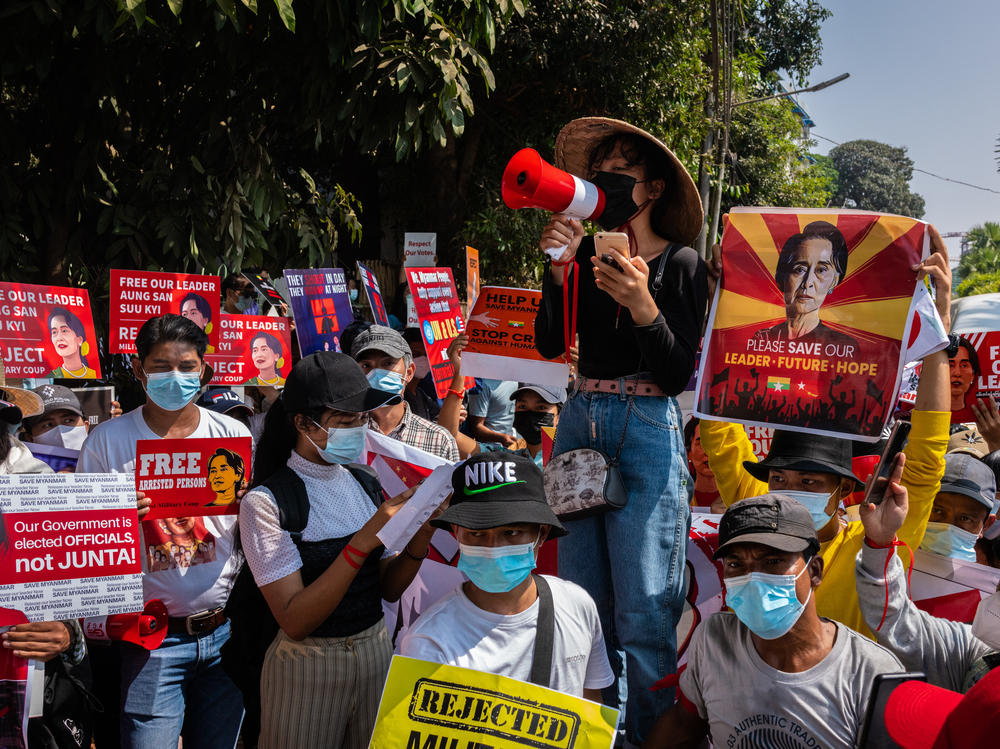Section Branding
Header Content
Myanmar's Coup Leaders Level More Charges Against Ousted Leader Suu Kyi
Primary Content
Ousted Myanmar leader Aung San Suu Kyi, who has been detained since the Feb. 1 coup that toppled her government, is facing new charges that might see her held indefinitely without trial.
Suu Kyi was initially accused of importing unregistered walkie-talkies, a charge widely viewed as a pretext for her arrest as the country's military junta consolidated power.
On Tuesday, however, her lawyer told journalists that the Nobel Peace Prize laureate had also been charged with violating Article 25 of the National Disaster Management Law. It wasn't immediately clear how the law is being applied in Suu Kyi's case, but The Associated Press says it has been used in the past to prosecute individuals who violated coronavirus restrictions. The new charge falls under a revised penal code that was amended last week to allow detention without a court order.
Suu Kyi — who spent some 15 years under house arrest before leading the country's first democratically elected government after decades of military rule — made a virtual appearance in court on Tuesday in the capital, Naypyitaw, where she reportedly answered questions about her representation and legal arrangements, according to the BBC.
She and deposed President U Win Myint were both arrested after the coup.
Britain's Foreign Secretary Dominic Raab tweeted after the latest charges against Suu Kyi that they were "politically motivated" and "a clear violation of her human rights."
The U.S. last week imposed economic sanctions on several of the coup leaders.
Suu Kyi, who held the title of state counselor and was the country's de facto leader, was removed from power after elections in November handed her National League for Democracy a resounding victory. Those same elections resulted in an embarrassing defeat for the military, which immediately labeled the results fraudulent. Despite its poor showing, the military is constitutionally guaranteed a minimum of one-quarter of all seats in the parliament.
Her brief court appearance came as a spokesman for Myanmar's newly installed military government held its first news conference since the coup more than two weeks ago. In it, Brig. Gen. Zaw Min Tun promised fresh elections, but apparently without providing a timetable.
"Our objective is to hold an election and hand power to the winning party," the spokesman for the ruling council said via Facebook Live, according to Reuters.
"We guarantee ... that the election will be held," he said, insisting also that Suu Kyi and others were not being detained, but were in their homes for their own security.
Meanwhile, popular unrest sparked by the coup continued on Tuesday despite an order banning large gatherings, with demonstrators turning out in Yangon and Mandalay, the country's largest and second-largest cities, respectively, as well as other cities, Reuters reports. They are demanding Suu Kyi's release and for the military government to immediately step down.
In Mandalay, security was light, with government forces concentrating on guarding key buildings in the city, such as state bank branches, the news agency said.
The government has restricted or temporarily blocked access to the Internet in an apparent bid to shut down unrest after it recently prepared a draft law to criminalize online activities it deems subversive. Reuters reports that there are also rumors that the government plans to install a firewall system to monitor or block access to the Web.
Copyright 2021 NPR. To see more, visit https://www.npr.org.

